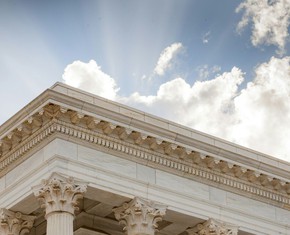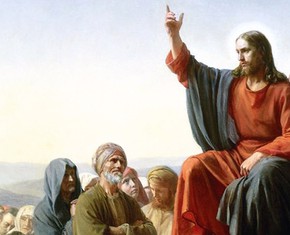The views expressed in our content reflect individual perspectives and do not represent the authoritative views of the Baha'i Faith.
Remember when Jesus asked this famous question: “Who do people say I am?” in the Gospel of Mark, followed by the very next question, “Who do you say I am?”
Of course, none of us witnessed Jesus actually asking them — but Jesus posed these two questions not only in Mark 8:27–29, but in their parallel passages, in Matthew 16:13–16, and Luke 9:18–20 as well.
These two questions, in essence, are really one and the same question, but from social (“people say”) and personal (“you say”) perspectives.
RELATED: Are There Really Seven Heavens?
Today, on Easter Sunday, the question invites our deepest reflection, as though Jesus had asked this question again to each of us directly.
March 30, 1997, was an Easter Sunday that I will never forget. A few days earlier, a reporter, the religion editor from The Ottawa Citizen, called me and told me that he was writing a feature article to be published on Easter Sunday under the title, “Easter Sunday: As others see him: Jesus asks all people ’Who do people say that I am?’ Here are replies from several non-Christians.”
Why did the reporter call me? Probably because I was an adjunct professor at Carleton University in Ottawa at the time, and was known as a member of the Baha’i Faith, which has no clergy. During that period, I was still a PhD student at the University of Toronto, but had moved to Ottawa, where my dear wife, Nahzy Abadi Buck, had landed a job as an intelligence analyst.
So I wrote this section below, which appeared in The Ottawa Citizen under the heading, “Baha’i and Jesus” (the religion editor’s headline, not mine):
_____________
Dr Christopher Buck is a Baha’i and a lecturer in religion at Carleton University. He writes:
… Baha’u’llah, who founded the Baha’i faith in Persia in the nineteenth century, and suffered imprisonment and exile for his beliefs [wrote]:
“Know thou that when the Son of Man yielded up His breath to God, the whole creation wept with a great weeping. By sacrificing Himself, however, a fresh capacity was infused into all created things. Its evidences, as witnessed in all the peoples of the earth, are now manifest before thee. The deepest wisdom which the sages have uttered, the profoundest learning which any mind hath unfolded, the arts which the ablest hands have produced, the influence exerted by the most potent of rulers, are but manifestations of the quickening power released by His transcendent, His all-pervasive, and resplendent Spirit.
“We testify that when He came into the world, He shed the splendor of His glory upon all created things. Through Him the leper recovered from the leprosy of perversity and ignorance. Through Him, the unchaste and wayward were healed. Through His power, born of Almighty God, the eyes of the blind were opened, and the soul of the sinner sanctified.
“Leprosy may be interpreted as any veil that interveneth between man and the recognition of the Lord, his God. Whoso alloweth himself to be shut out from Him is indeed a leper, who shall not be remembered in the Kingdom of God, the Mighty, the All-Praised. We bear witness that through the power of the Word of God every leper was cleansed, every sickness was healed, every human infirmity was banished. He it is Who purified the world. Blessed is the man who, with a face beaming with light, hath turned towards Him.”
This statement is remarkable in that Baha’u’llah attributes the rise of western civilization to the spiritual power unleashed by Christ’s passion on the Cross. The masterpieces of art, the great works of philosophy, the discoveries of science, even the rise of the Great Powers in nineteenth-century Europe are traced to Christ’s influence. This is part of Baha’u’llah’s theory of civilization and the role that Jesus Christ has played in it.
On comparative grounds, this seems to me to be a rather unique Christology. Baha’u’llah has a very high Christology. In its basic features, it differs little from a Christian perspective except that Baha’is see Christ as God in nature but not in essence. (Baha’u’llah has advanced a doctrine of manifestation in place of the Christian doctrine of Incarnation.) There is also the fact that Baha’u’llah’s Christology is not exclusive, as it recognizes the authenticity and greatness of Muhammad, Zoroaster, Krishna, and the Buddha as well. Even so, Baha’u’llah clearly attaches enormous significance to the Christ event.
The Cross is seen as a cosmic event, and the person and work of Christ is viewed as a watershed in human history. Baha’u’llah’s connection of the Christ-event to the history of Western civilization goes far beyond any notion of personal salvation in the traditional sense, such that, in my own understanding, Baha’u’llah extends what systematic theologians call the order of salvation to civilization itself. Baha’is are quite concerned with what theologians call mutual salvation, which Baha’is see as a complement to personal salvation.
Speaking personally, and not as an academic, as a former Christian, I found that I was able to carry my belief and love of Christ into my faith as a Baha’i. Baha’is regard Baha’u’llah as the one foretold by Christ, so there is really no reason for a Baha’i to wish to diminish the greatness of Christ. To do so would be to diminish the greatness of Baha’u’llah and to violate Baha’u’llah’s doctrine of the fraternity of the great religious figures of history and the accumulative nature of their teachings, which Baha’is refer to as “progressive revelation.”
RELATED: Is the Bible Infallible and Inerrant?
Looking back on this many years later, today, my response to The Ottawa Citizen’s religion editor’s invitation to offer a Baha’i perspective on Jesus’s historic yet timeless and perennial question would probably be much the same as before, with this added personal reflection on a prophecy by Jesus in the “Farewell Discourse” (John, Chapters 14–17):
Nevertheless I tell you the truth; It is expedient for you that I go away: for if I go not away, the Comforter will not come unto you; but if I depart, I will send him unto you. And when he is come, he will reprove the world of sin, and of righteousness, and of judgment: Of sin, because they believe not on me; Of righteousness, because I go to my Father, and ye see me no more; Of judgment, because the prince of this world is judged.
I have yet many things to say unto you, but ye cannot bear them now. Howbeit when he, the Spirit of truth, is come, he will guide you into all truth: for he shall not speak of himself; but whatsoever he shall hear, that shall he speak: and he will shew you things to come. He shall glorify me: for he shall receive of mine, and shall shew it unto you.
In the passage quoted in The Ottawa Citizen’s Easter Sunday feature article, Baha’u’llah speaks of Jesus’s empowering spiritual impact, giving rise to Western civilization, if I have read Baha’u’llah’s passage with a true and correct understanding. There’s no way that Jesus could have even hinted at this future development, which would have been incomprehensible to Christ’s immediate disciples at that time. In so doing, Baha’u’llah has fulfilled Christ’s prophecy: “He shall glorify me.”
















Comments
Sign in or create an account
Continue with Googleor